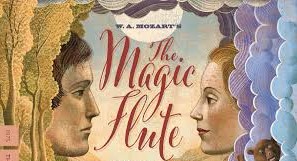The Magic Flute

by Wolfgang Mozart
“Though men may rule kingdoms if they can, none is more noble than wife and man.”
In this charming fable we see a callow Prince learn the ways of the world and gain enlightenment as he pursues love and virtue. One of the lessons he learns is that true humanity is gained by committing to a life with another person. You will be amused, entertained and touched by this lovely new English performing version.
Excerpt:
Act II, #17: Pamina: “Ach, ich fühls…”
“Ah, I’ve lost it: what I most cherished,
from my heart so cruelly torn.
Life without him, is not living,
lost, forgotten and forlorn.
See, Tamino, my tears of anguish,
shed for you with my last breath.
Without your love, I’ll surely languish.
I’ll find my peace only in death.”
Translation copyright Kenneth Jakobs 2023
All rights reserved
Notes
The Magic Flute (Die Zauberflöte) was Mozart’s last operatic work, and is probably his most beloved. Graced with some exquisite music, its plot and characters are rather two-dimensional, and its libretto (by his theatrical friend, Emanuel Schikaneder) is generally not much admired, particularly when compared to the brilliant libretti of Lorenzo Da Ponte in three other great Mozart operas.
The piece is actually a singspiel, i.e., sung numbers with spoken dialogue. The dialogue is frankly rather uninspired and, lacking the accompaniment of Mozart’s great music, is often severely trimmed in performance. I have shortened it a bit but mostly left the final cuts up to the director.
Essentially a fairy tale with a bit of Masonic mysticism thrown in, Flute features love at first sight, lost and restored, a fierce serpent, enchanted beasts, magical musical instruments, a prince, a queen (who sings high F’s), a strange man with feathers, and priests, singing boys and ladies. The protagonist must endure various trials in order to transcend his youth and lack of wisdom, and to achieve spiritual enlightenment through love and marriage.
My English performing translation preserves the charming scheme of rhymed couplets and is mostly faithful to the original. It should be noted that Schikaneder lived in a world (late 18th century Europe) where men did not consider women their equals, and consequently, this work is rife with what today are deemed misogynistic remarks. It is really not possible to create a translation free of these elements and still be able to call it The Magic Flute. They are just too much a part of its fabric. Some also see racist elements, which I have opted to work around by making the sole black character something quite different.
I believe you will enjoy this new, heartfelt and very entertaining performing version.
